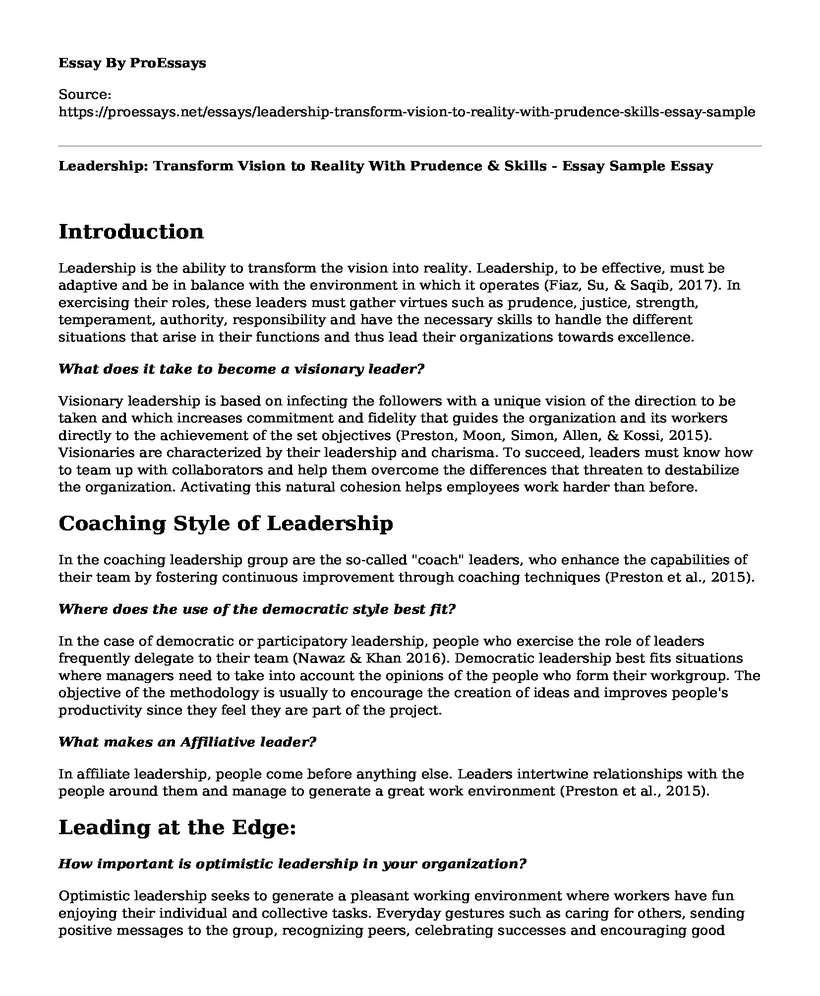Introduction
Leadership is the ability to transform the vision into reality. Leadership, to be effective, must be adaptive and be in balance with the environment in which it operates (Fiaz, Su, & Saqib, 2017). In exercising their roles, these leaders must gather virtues such as prudence, justice, strength, temperament, authority, responsibility and have the necessary skills to handle the different situations that arise in their functions and thus lead their organizations towards excellence.
What does it take to become a visionary leader?
Visionary leadership is based on infecting the followers with a unique vision of the direction to be taken and which increases commitment and fidelity that guides the organization and its workers directly to the achievement of the set objectives (Preston, Moon, Simon, Allen, & Kossi, 2015). Visionaries are characterized by their leadership and charisma. To succeed, leaders must know how to team up with collaborators and help them overcome the differences that threaten to destabilize the organization. Activating this natural cohesion helps employees work harder than before.
Coaching Style of Leadership
In the coaching leadership group are the so-called "coach" leaders, who enhance the capabilities of their team by fostering continuous improvement through coaching techniques (Preston et al., 2015).
Where does the use of the democratic style best fit?
In the case of democratic or participatory leadership, people who exercise the role of leaders frequently delegate to their team (Nawaz & Khan 2016). Democratic leadership best fits situations where managers need to take into account the opinions of the people who form their workgroup. The objective of the methodology is usually to encourage the creation of ideas and improves people's productivity since they feel they are part of the project.
What makes an Affiliative leader?
In affiliate leadership, people come before anything else. Leaders intertwine relationships with the people around them and manage to generate a great work environment (Preston et al., 2015).
Leading at the Edge:
How important is optimistic leadership in your organization?
Optimistic leadership seeks to generate a pleasant working environment where workers have fun enjoying their individual and collective tasks. Everyday gestures such as caring for others, sending positive messages to the group, recognizing peers, celebrating successes and encouraging good humor, are part of all the components of the group, and not just the Leader.
Although few organizations have explained to their managers how to arouse their workers with positive thoughts, many studies have already shown that "optimism in action" has a direct impact on improved productivity and worker commitment (Fiaz et al., 2017). This management style always emphasizes the positive aspects and strengths of workers. Likewise, optimistic managers focus their management on creating the circumstances in which employees can prosper. Open communication and fluid interpersonal relationships also characterize the optimistic manager. Optimism or positive thinking is one of the keys to the success of personal, work and social leadership.
Do you have a person to turn to when professional stresses occur?
Professional stress is a major inhibitor to employee performance. In the workplace, the Human Resource manager plays a crucial role in provoking the emotion of joy and satisfaction by reminding employees of their achievements. Every day there are small or large profits in our work environment. The HR is attentive to these achievements and knows how to celebrate every win, every positive change, and every success as a way of dealing with stress.
How important is it for leaders to make sure their subordinates feel supported?
It is almost inevitable to recognize that a good part of the workers are concerned about the relationship they have with their managers. In fact, having frequent disagreements with bosses can lead to physical and psychological disorders such as stress, insecurity, insomnia or low self-esteem. Employee support is a crucial part of their performance as it demonstrates their value in the company and creates a stimulating work environment (Yahaya & Ebrahim, 2016). Leaders who celebrate and acknowledge everyone's participation and merit stimulates and motivates them to move forward.
How important is it for leaders to feel they are supported by subordinates?
Good leaders understand that their responsibilities as far as implementing action plans are in the background and that the subordinates are the ones involved in the actual implementation. In this sense, feeling supported by the subordinates is important to them as that support is what enables the employees to transform the goals into reality. To build a healthy work environment, it is important that the bond that unites people with their superiors be as supportive, friendly and correct as possible, maintaining a close relationship in their right measure: without exceeding trust, or hindering communication between them and the team.
References
Fiaz, M., Su, Q., & Saqib, A. (2017). Leadership styles and employees' motivation: Perspective from an emerging economy. The Journal of Developing Areas, 51(4), 143-156.
Nawaz, Z. A. K. D. A., & Khan_ PhD, I. (2016). Leadership theories and styles: A literature review. Leadership, 16(1), 1-7.
Preston, G., Moon, J., Simon, R., Allen, S., & Kossi, E. (2015). The relevance of emotional intelligence in project leadership. Journal of Information Technology and Economic Development, 6(1), 16.
Yahaya, R., & Ebrahim, F. (2016). Leadership styles and organizational commitment: literature review. Journal of Management Development. Retrieved from DOI 10.1108/JMD-01-2015-0004
Cite this page
Leadership: Transform Vision to Reality With Prudence & Skills - Essay Sample. (2023, Mar 27). Retrieved from https://proessays.net/essays/leadership-transform-vision-to-reality-with-prudence-skills-essay-sample
If you are the original author of this essay and no longer wish to have it published on the ProEssays website, please click below to request its removal:
- Essay Sample: SWOT Analysis and Interest of Stakeholders for Sainsbury
- Paper Example on Perception and Individual Decision Making
- Elements of a Well-Written Mission and Project Manager Profession Essay Examples
- Banking Retail Product Development or Customer Satisfaction, Effect of Management Decision
- Essay Sample on Management of Change in Schools
- Essay Example on Social Style Model: Enhancing Workplace Quality
- Decision Making - Free Essay Example







